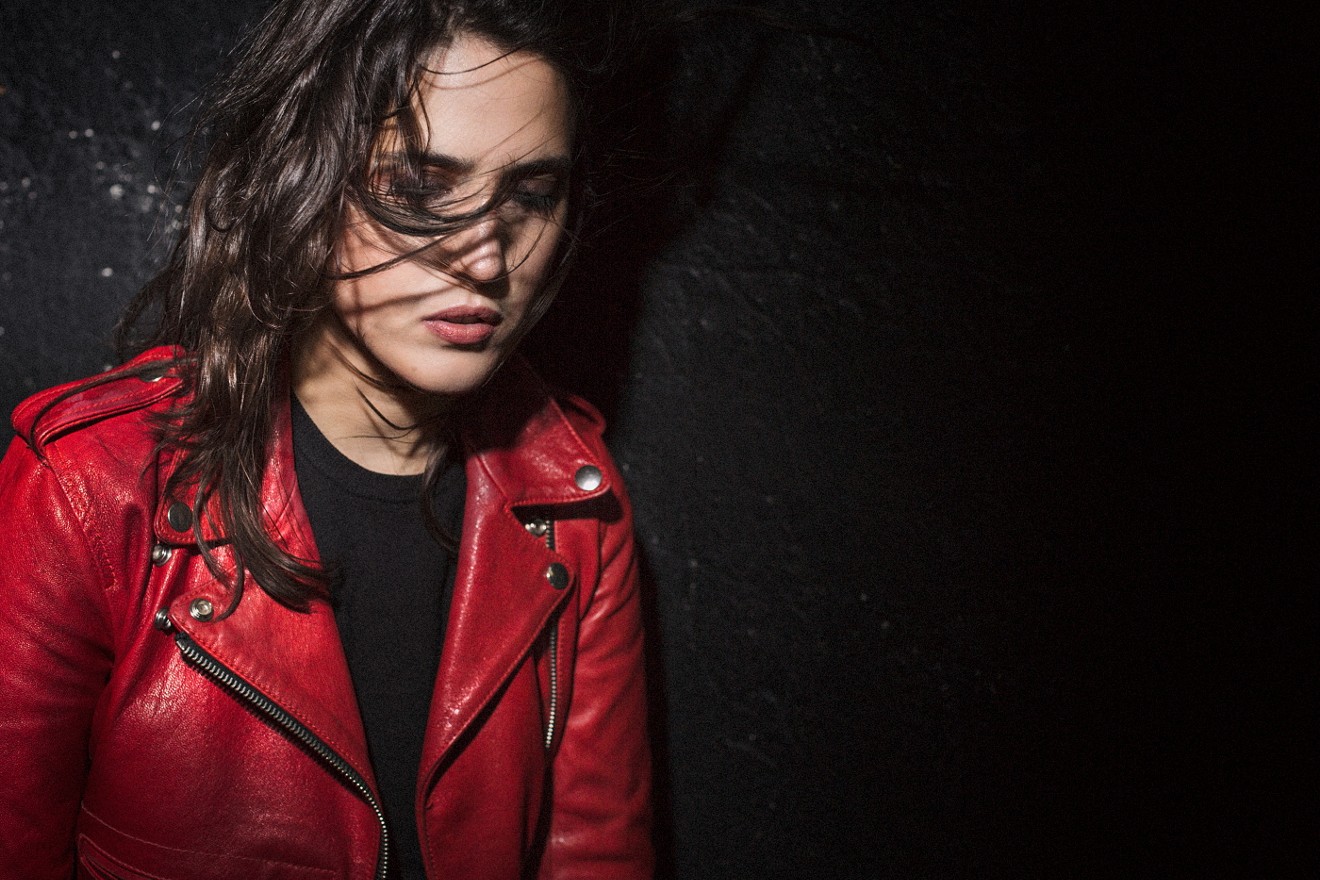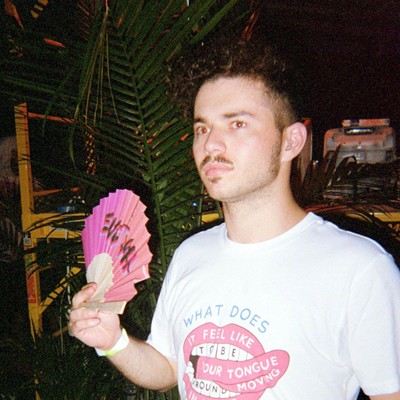More than most other cities, Miami loves electro. It can be heard in the artists birthed here, the musical styles named for the city, and the pioneers who’ve either taken up residence or regularly visit here.
Electro might not be German DJ/producer Helena Hauff's only genre, but it's the one with which she’s most closely associated. After a slew of great releases and several widely seen DJ sets, Hauff has quickly become not only one of the most discussed names in dance music but also a bellwether of the scene. If her increasing popularity and our political climate are any indication, 2018 is an all-time peak year for dancers choosing to get knocked upside the head by fucked-up and downright nasty machine music.
Tomorrow will see Hauff make her long-awaited Miami debut at Electric Pickle courtesy of the SAFE crew. Before the occasion, she traded words with New Times about what she expects in the Magic City, club culture here, and her aversion to social media.
New Times: Your DJ set at Electric Pickle this Friday will mark your debut musical performance in Miami. Will this be your first time in Florida or Miami period, and are you arriving with any preconceptions about the city?
Helena Hauff: It’s gonna be my first time in Miami. I heard that you can still smoke inside clubs — I love that. I wish I could stay longer to go swimming with dolphins or something stupid like that.
In interviews, you’ve alluded to your attraction to radical ideas. Where or how did you first encounter these ideas, and how do they relate to your career as a DJ-producer?
I got into clubbing and techno because it’s just a lot of fun — that didn’t have anything to do with philosophy or politics. It was great to find out that the club scene (especially in Germany, I guess) is quite political. People seem very open-minded, and there’s a lot of discussion around political issues, as well as trying to create an environment of equality and respect.
Do you believe dance culture or clubs are still capable of incubating radical social change?
No. You can already see how fragile this whole freedom thing is. We can and should try to go on the streets (see [the beseiged Georgian club] Bassiani) and say what we think. But if [the powers that be] wanna shut us down, they can and will do that.
You began DJ'ing at Hamburg's Golden Pudel, which you frequented in your teens. Was there any particular moment, conversation or DJ set that inspired you to make the transition from being an attendee and consumer to DJ'ing yourself?
There was no particular moment. Perhaps the first time I went to a warehouse rave in Hamburg, I can’t remember the DJ, but I snuck backstage and I liked the idea of free drinks.
Did you wrestle with any trepidation or creative self-doubt about producing music versus DJ'ing?
I actually had a go at production first, but I didn’t have any hardware and couldn’t really get into the computer thing. I then started collecting records and DJ'ing, and when I got my first sampler a couple of years later, I got properly into making music. Making music is very different from DJ'ing — it didn’t come easily, and I had self-doubt, yes. I think that’s very normal.
Having played festivals such as Dekmantel and with events such as Panorama Music Festival on your itinerary, have you had to adjust your approach to DJing at all in this transition from smaller rooms to bigger tents? Has it been a challenge of retaining the intimacy and intensity that electro, EBM, etc. evoke in dark, tiny venues?
You have to play a bit differently. Some more "fragile" songs just don’t work in bigger rooms — you can’t even really hear them. But some of the stuff I love didn’t work in small venues either. Bigger venues just have a different energy — not better or worse — but I enjoy the challenge [of playing to a large crowd] a lot. But I still love the small venues too.
You’ve never made a secret of your reluctance to engage in social media. Now that recent political events have highlighted many of the perils of virtual life, do you feel any sort of validation regarding your foresight, or have they just doubly confirmed what you already knew to be true?
Honestly, with recent events, I’m really surprised that people seem surprised or shocked. Facebook should’ve made it more clear what they were doing, but I don’t think that anyone would’ve stopped using it anyway. And I find that a bit sad and scary. We all know what’s going on, but we don’t care because we like the "likes" just a little too much. I was always like, "Yeah, it’s got pros and cons," but now I really can’t see how anything positive comes out of that crap at all (or nothing positive that could not have been done in another way, anyway).
Has stepping away from social media been freeing creatively? Would it be safe to assume that working with analogue equipment as opposed to computers has made it easier than it would be otherwise?
I don’t know about it being freeing creatively. I didn’t step away from it; I never used it in the first place. Also, it’s got absolutely nothing to do with using analogue equipment — I spend more time on the computer than I do in the studio or behind the decks, unfortunately; I just get too many emails.
It seems as though you don’t have a lot of hang ups about the act of creation or embarking upon new projects. Whereas many artists struggle with their output, you seem quite comfortable with your abilities and engaging with new and challenging projects; just “doing it” as it were. How did you reach this point, and how do you retain that confidence among the demands of touring, audience expectations, etc.?
That’s wrong [laughs]. I think I’m like most musicians. Sometimes you’re very creative, and sometimes you don’t know what the hell to do with your music and your life. But when I do, then I just do! That’s right [laughs].
What lies ahead in 2018 or beyond?
A new album on Ninja Tune and releases by Galaxian and Morah on my own label.
Finally, what attracts you so strongly to the darker or more ominous sounds of techno, electro, and EBM as opposed to the likes of house or disco?
It’s just personal taste. I think there’s no point in overanalyzing it; it’s taste. Some people like country-pop, some like classical music, and some like electro-acid-rave stuff.
Helena Hauff. With Anshaw Black. 11 p.m. Friday, May 25, at Electric Pickle, 2826 N. Miami Ave., Miami; 305-456-5613; electricpicklemiami.com. Tickets cost $22.50 via residentadvisor.net and will be available at the door.
[
{
"name": "Air - MediumRectangle - Inline Content - Mobile Display Size",
"component": "19274298",
"insertPoint": "2",
"requiredCountToDisplay": "2"
},{
"name": "Editor Picks",
"component": "17482312",
"insertPoint": "4",
"requiredCountToDisplay": "1"
},{
"name": "Inline Links",
"component": "18711090",
"insertPoint": "8th",
"startingPoint": 8,
"requiredCountToDisplay": "7",
"maxInsertions": 25
},{
"name": "Air - MediumRectangle - Combo - Inline Content",
"component": "17482310",
"insertPoint": "8th",
"startingPoint": 8,
"requiredCountToDisplay": "7",
"maxInsertions": 25
},{
"name": "Inline Links",
"component": "18711090",
"insertPoint": "8th",
"startingPoint": 12,
"requiredCountToDisplay": "11",
"maxInsertions": 25
},{
"name": "Air - Leaderboard Tower - Combo - Inline Content",
"component": "17482313",
"insertPoint": "8th",
"startingPoint": 12,
"requiredCountToDisplay": "11",
"maxInsertions": 25
}
]












